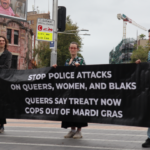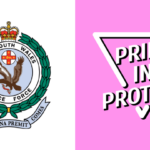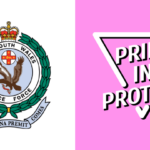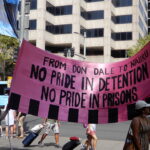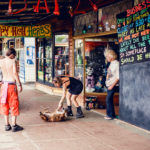Why NSW Police Should Have Stayed Out of Mardi Gras
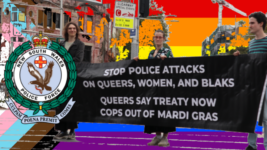
After the Sydney Gay and Lesbian Mardi Gras Board requested the NSW Police Force will not march in Saturday’s parade, bowing to a pressure campaign, which involved the likes of NSW premier Chris Minns, police minister Yasmin Catley and even PM Anthony Albanese, the decision was reversed.
But why? Why do all these politicians care? If it got to the point that the Mardi Gras Board, which had long been resistant to persistent calls for cops out of the parade, made the decision to request NSW police not participate in this year’s event as a specific group, why must they?
The reason that would necessitate NSW police, a body long known to be steeped in homophobia, to take part in an LBGTIQA+ event would appear to be to provide the force with legitimacy, as the fact that a senior constable allegedly just killed two gay men, left it with waning supply.
NSW police commissioner Karen Webb is “delighted” with the reversal. This was after she responded to criticism that she’d been slow to address the community following the double murder with the line, “There will always be haters. Haters like to hate. Isn’t that what Taylor says?”
But the contemporary quip on the part of the top cop drew fresh criticism.
NSW police senior constable Beau Lamarre-Condon allegedly shot his ex-fling Jesse Baird and partner Luke Davies using his police gun, and it appears that as the suspected killer is a gay man who shot a once intimate partner this is being presented as somehow diluting NSW police responsibility.
Defund the police
NSW police is now responsible for investigating the critical incident, which leaves many concerned as to outcomes. The state does have an independent watchdog, the Law Enforcement Conduct Commission, which, since inception in 2017, only oversights police investigations into police killings.
These concerns are hardly reserved to the queer community either. Police violence towards First Nations people has been par for the course since its establishment. And last year saw concerted calls for police reform due to the shooting or tasering deaths of five people having mental health crises.
“The issues around policing and the queer community, policing and other communities, have pervaded this state since this state existed,” NSW Council for Civil Liberties last standing president Josh Pallas told reporters on Tuesday: the day after the request for no police participation.
The lawyer cited the “long history of police violence and homophobia directed at the queer community”.
Indeed, a recent report into unsolved gay hate crimes between 1970 and 2010 described “a culture of oppression and discrimination against the LGBTIQ community” within the force.
Pallas considers the alleged double murder has led to a moment of reckoning, involving three long-term community concerns that must be addressed: disarming police, an independent assessment of the NSW police weapons policy and police can no longer be investing police critical incidents.
Social justice group Pride in Protest has been campaigning for cops out of Mardi Gras since 2018, in regard to disproportionate police brutality towards queer people, First Nations people and other overpoliced communities.
The Mardi Gras Board has always resisted these calls, but the recent murders were the final straw. The board didn’t criticise police, all it requested was that the force refrain from marching as the community needs “space to grieve”. And the AFP announced it wouldn’t march of its own accord.
The reaction from Minns and Webb has amounted to shrugging and stating, “What’s all the fuss about.” And this gaslighting pressure saw the board cave when confronted by the combined force of the NSW police and the NSW state.
And a Pride in Protest snap rally is now planned for Friday evening insisting NSW police don’t attend.
“The NSW police are complicit in the deaths,” Pride in Protest’s Charlie Murphy told the press, adding that Lamarre allegedly used a police gun he’d checked out over a number of days, while Baird had raised safety concerns to NSW police about the behaviour of one of its officers.
A history of violence
“I am delighted that our LGBTQIA+ officers, as well as our other police who are allies and supporters, will be allowed to march this year as they have done for the past 20 years,” said the NSW police commissioner, after her law enforcement body couldn’t just respect a simple request.
Webb made this declaration in spite of the fact that officers of the force she now administers surrounded, beat upon and then arrested the initial 1978 Mardi Gras march, which was a demonstration calling for an end to the criminalisation of people of diverse sexualities and genders.
The initial march that NSW police partook in was that of 1998, and the first cab off the rank that night was a protest float depicting police violence against the queer community.
Lamarre marched in full uniform in the 2020 Mardi Gras parade and on 19 February this year, he shot two gay men.
The city is still haunted by the time of gay hate crimes and murders, especially the last three decades of the 20th century, when queer bashings in the inner city were common. And the recent inquiry found “the immediate effect of violence was compounded by the responses of the NSWPF.
Some officers were found to be “indifferent, negligent, dismissive or hostile”. And Commissioner John Suckar found that there was no doubt NSW police homophobia, transphobia and prejudice had caused the inadequate response to the murdered considered to be from the LGBTIQA+ community.
“The Sydney Gay and Lesbian Mardi Gras is an important event on the NSW police calendar and as commissioner, I am committed to continuing to strengthen the relationship between my organisation and the LGBTQIA+ community,” Webb continued.
The compromise come to is that NSW police officers can march together as a group in plain clothes, however for those participants attending the Mardi Gras party afterwards, they’ll be greeted by walls of fully uniformed and armed police officers at the entrance to the event, anyway.
These officers will be accompanied by drug detection dogs, which are known to make indications falsely on two-thirds of occasions. However, after an unsuccessful pat down search, many attendees will be dragged away for an again two-thirds of the time fruitless strip search.
And in light of recent events, an individual being taken away and ordered to remove all their clothes in front of two armed and uniformed strangers, and then being told to squat and cough in front of them, could have quite a jarring effect.
A coalition for police reform
Following the plain clothes police on parade compromise, a coalition of civil society groups have raised up voices in support: First Mardi Gras Inc, Redfern Legal Centre, National Justice Project, Inner City Legal Centre, Human Rights Law Centre, Community Legal Centres NSW and NSWCCL.
An open letter to the premier calls for government reflection “on whether policing settings in this state are fit for purpose”, especially on intimate partner violence, use of force and weapons, as well as the long-raised issue of police investigating police in regard to misconduct and critical incidents.
NSW Greens MLC Sue Higginson began calling for an inquiry into policing powers last May, after an officer lethally tasered a 95-year-old. The Greens justice spokesperson told Sydney Criminal Lawyers at the time that within the NSW police “use of excessive force and misconduct are systemic”.
Greens MLC Amanda Cohn is chairing an inquiry that includes looking into alternatives to law enforcement policing mental health episodes. And the National Justice Project called for a Royal Commission into all Australian police in terms of brutality and deadly force.
The Redfern Legal Centre sent out a statement on Thursday morning calling for an “independent review of NSW police handling of service firearms”, and this should be carried out by the NSW auditor general, and not, as Webb has arranged, conducted by the Victorian police commissioner.
“We need to move away from police reviewing police and police procedures,” said Redfern Legal Centre police accountability practice senior solicitor Samantha Lee.
“Police have access to the highest-powered handgun available in Australia – the Glock,” she continued. “NSW police are investigating whether murder-accused senior constable Beau Lamarre was lawfully in possession of the police-issued handgun.”
“We can’t allow this critical public safety review to happen behind closed doors and by another police force.”
Pride in Protest’s No Cops No Bigots snap action is gathering at Gadigal-Sydney’s Taylor Square at 8 pm Friday 1 March
The event notification adds that this week at “Cumberland Council, trans activists were confronted by over 100 far-right Christian fascists pushing to erase the queer community from public life by passing a motion, supported by Labor, to ban drag story time”.


